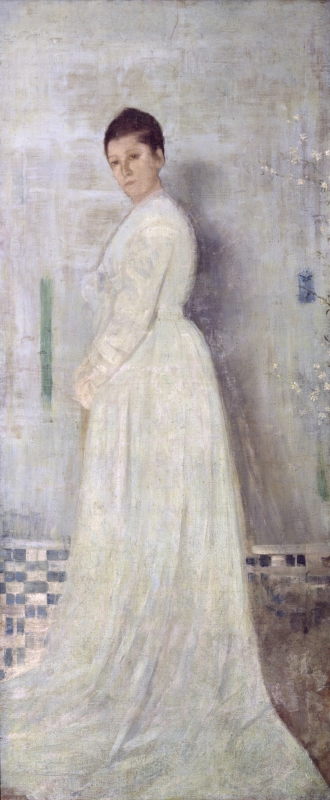Technique
The 1980 catalogue raisonné stated: 'Although it is clear that it has been scraped down, probably by Whistler, and reworked, probably by other hands, it was originally a work by him.' (cat. no. 126). This is by no means certain, since what is actually visible now (2020), does not look like the work of Whistler.
It was thinly painted, and there are signs of pentimenti, though whether these were by another painter or restorer is not known. The skirt was originally much wider at the right, possibly with a bow behind her waist. It is possible that the face was a later addition, the original head having been rubbed out. In its current condition, the technique is unlike Whistler's usual work.
The small butterfly, very thinly painted and lightly touched up, is somewhat similar to Whistler's signature from the early 1870s. It appears from a distance to be on a cartouche, but this is an illusion created by the overpainting of the background, which stops short of a rectangular field surrounding the butterfly.
Further technical investigation of this painting might ascertain if underneath what can be seen today (2020) there is a rubbed down painting by Whistler, and also see if it has any connection with another multiply reworked portrait, Portrait of a woman [YMSM 126b].
Conservation History
On 15 September 1910 Dowdeswell, a London art dealer, took Whistler's biographers, Elizabeth Robins Pennell (1855-1936) and Joseph Pennell (1860-1926), to a man 'in a remote part of Camden Town, who is restoring a few' of the canvases, and they were shown an unsigned portrait:
'[A] woman, middle-aged with black hair drawn rather tightly back, in a white muslin gown, date I should say the Sixties, standing against a white background with at the bottom a low dado of blue-and-white (tiles or matting) with a long green stroke of the brush on one side and two touches of blue on the other, very Whistler, and not much tampered with by the restorer though he was thinking of cleaning away the strokes of green and blue.' 1
According to Sir Philip Anstiss Hendy, Director of the Leeds City Art Gallery, it had been rolled up and 'in order to cover the resulting cracks, a good deal of inferior painting had been done on the dress.' 2 Hendy also wrote that 'Our picture also had been rolled up and probably sat on after wards - by the look of it ... The recent cleaning was done by Ruhemann, who is a man of considerable knowledge and judgment.' 3
A comparison of photographs taken in 1947 and recently, reproduced above, does not reveal any notable changes, such differences as exist probably being due to different lighting and photographic methods.
A conservation report from Leeds City Art Gallery in 2019 notes that there are multiple areas of overpaint covering older damage, some abrasion to the paint layers at the model's hair, and a scratch at the lower right corner. The thick natural resin varnish is discoloured.
Frame
The machine-cut gilded wooden frame probably dates from 1910.
Last updated: 21st October 2020 by Margaret







